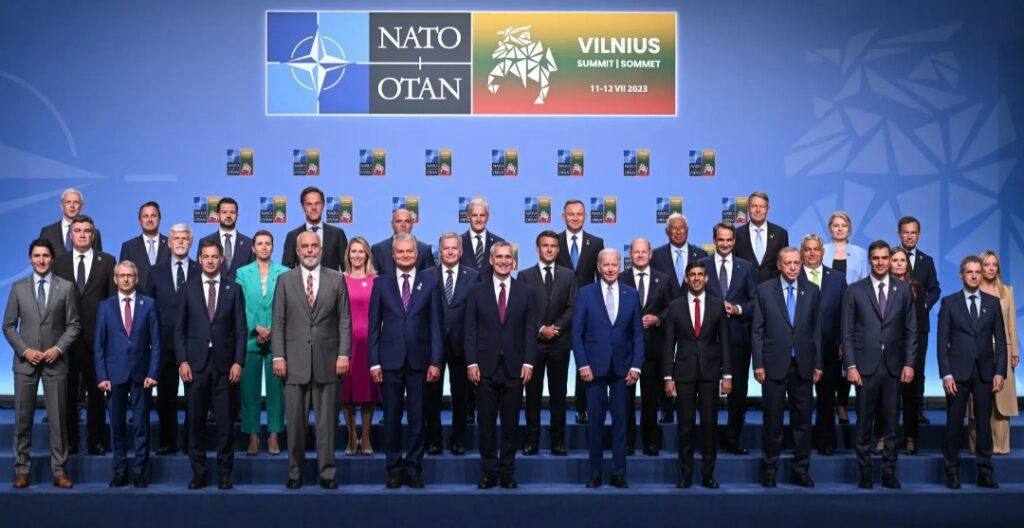By: Hitti Chopra, Research Analyst, GSDN

The NATO members gathered at Lithuania on July 11-12, 2023 bringing the 31 allies together in Vilnius, which is just 20 miles from Belarus, a Russian ally. The meet was attended by anticipated member Sweden, newly acceded Finland, assorted non-NATO members and Ukrainian President Volodymyr Zelensky.
North Atlantic Treaty, also known as Washington Treaty was formed in response to USSR Joseph Stalin’s attempt to bring states under communist rule. NATO considers Russia as a revisionist and belligerent power and their history is tied together since 1949. From the fall of Berlin wall in 1989 with 16 countries as members to collapse of USSR in the 1990s to leading to total up to 31 members, with Finland being the latest member onboard, NATO today has a total 31 members. The allied unity of NATO especially since Russia aggression against Ukraine is paving the way for the re-emergence of NATO which had lost its essence since 1990s.
The position on Ukraine’s admission in NATO was the key question at the summit and it was decided that the “We will be in a position to extend an invitation to Ukraine to join the Alliance when Allies agree and conditions are met.” This position cogitates about the United States and its ally’s perspective to curtail any risk involving Russia accentuating the conflict in Ukraine and beyond. The NATO members came to a conclusion that not now, but sooner or later Ukraine will be a part of NATO, signalling a commitment, support which is a roadblock in Russia’s motive. Russia since the beginning has been a firm believer of curtailing the expansionist motive of NATO which has been exposed with Finland and Sweden now part of the US ally organization.
Turkey, initially was not in favour of Sweden accession in NATO, but the former agreed which can increase the obstacles for Russian government. For the longest period of time, Turkey was pro-Russia, but since the re-election of Turkish President Recep Tayyip Erdogan, the leader is on the move of mending ties with the West. Russia has criticized this twitch by Turkey and reportedly the country officials have been suggesting that Turkey is turning into an “unfriendly country.”
China has been independently supporting Russia against its war with Ukraine. From establishing parallel financial institutions to aid Russia, to strengthening its hegemony over regions considered a strategic monopoly of the West, like Taiwan, China has been assertive and focused on countering the rising American leadership precondition in global matters.
The NATO summit in Vilnius, Lithuania was attended by global leaders like Prime Minister Anthony Albanese of Australia, Prime Minister Chris Hipkins of New Zealand, Prime Minister Fumio Kishida of Japan, and President Yoon Suk-yeol of South Korea. The NATO summit in Madrid (2022) released its Strategic Concept which expressed and revealed the Chinese ambitions vis a vis Asia-Pacific- which is important for the NATO in an interconnected world.
The summit exhibited Joe Biden’s diplomatic strategy by partnering with those like-minded countries as it not only serves the purpose of countering China but at the same time it reflected the awareness of its European allies, highlighting that the security of the Indo-Pacific and Euro-Atlantic regions are closely interconnected. The partnering of NATO with like-minded countries in the Chinese dominated areas like cyber defence, arms control, technology, hybrid threats, and climate change (which have been a challenge for the NATO member states initially) is in anti-Beijing interest. China expressed its concerns over the NATO summit being held at Lithuania by a warning “any act that jeopardises China’s legitimate rights and interests will be met with a resolute response.”
The presence of the West and its allies in Tokyo or Asia can be observed as a threat to the neutrality that is often preferred by small nation states as well as raises concerns over strategic interests for ASEAN and South Asian countries. The NATO plans and presence of its allies in regions which are in close proximity to China brings an echo of the Cold War bloc politics. The international treaties of the post-Cold War era need to cater to the global dynamics of the 21st century and its integral that it aligns and simulates with the realities of today.

